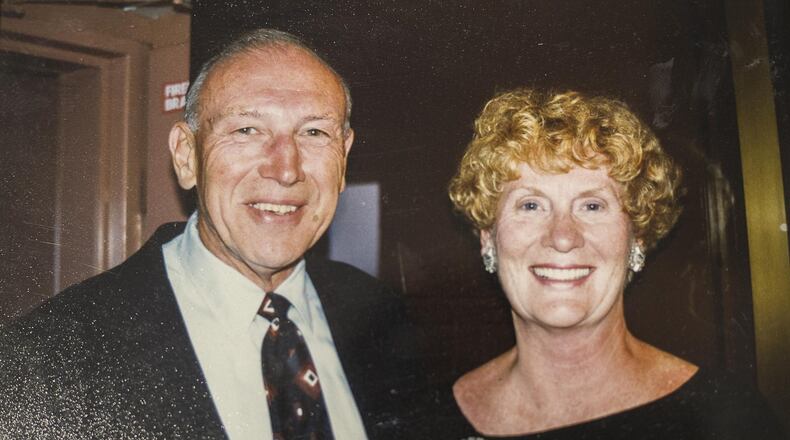A 91-year-old resident of an upscale assisted living facility left his daughter a series of frantic, late-night voice mails in 2017, saying “I’m dying.” He also told his morning caregiver, “He punched me,” according to testimony this week in a Cobb County murder and elder abuse trial.
Later that morning, Adam Bennett arrived at the hospital with broken ribs and bruises on his face, side and chest. He died within days.
Now, a jury will decide if Landon Jean Pierre Terrel, who worked nights as a caretaker at Sunrise of East Cobb, caused Bennett’s death.
Testimony in Terrel’s trial concluded Friday afternoon. If he is convicted on the charges of murder, elder abuse and elder neglect, he could face up life in prison. The jury began deliberations late Friday before being released for the weekend. Jurors will resume their work on Monday.
Terrel was assigned to care for Bennett the night before the injuries were discovered. He told police investigating the case that Bennett was combative that night when he was trying to change the man’s adult diaper. The former Sunrise caregiver explained to police, in a videotaped interview presented to the jury, that he caught Bennett as the man started to fall from his bed and that Bennett’s chest hit the side of the bed. But he insisted he saw no marks or injuries on the elderly man.
He admitted to poor judgment for failing to respond to Bennett’s complaints of being in pain that night, according to police testimony and recorded interviews with Terrel that were played for the jury.
Dr. James Downs, a Georgia medical examiner who was a defense expert, testified Friday that the injuries did suggest a fall, not an assault.
But a detective testified that Terrel’s description of what had happened wasn’t in line with Bennett’s injuries.
And Dr. Christopher Gulledge, the Cobb County medical examiner, said Bennett’s injuries suggested an assault, and he ruled Bennett’s death a homicide.
Terrel was charged with "felony murder," which means someone is killed during the commission of a felony. Felony murder does not suggest that the death was intentional.
A point of contention during the trial was whether Bennett’s statements were credible evidence that he had been assaulted. At 91, Bennett was frail and had a history of repeated falls. He also had memory issues.
By the time Bennett arrived at the hospital, he was no longer able to speak and could not be interviewed by police.
Jason Marbutt, the senior assistant district attorney who prosecuted the case, replayed the voicemails that Bennett left on his daughter’s phone. “This is about a 91-year-old man,” Marbutt said during his closing argument. “He spoke to you. The state is asking you to listen.”
In the series of voice mails, Bennett was heard telling his daughter he was dying, asking for help and telling her to hurry. Marbutt said when help finally arrived the next morning, Bennett told the staff what had happened, saying he had been hit.
Bennett’s daughter Christine Houk testified that despite his age and memory issues, his mind was sharp. She lived near the Sunrise facility and visited him frequently.
But Downs, the defense’s medical expert, said memory issues undermined the credibility of Bennett’s statement that he had been assaulted.
Defense attorney Aaron Henrickson argued that Bennett’s long history of falls and confusion had to be considered. With one expert saying the injuries were caused by a fall, and another saying it was more likely an assault, the prosecution didn’t leave the jury with any clear evidence of a crime, he said, or even exactly what happened.
“You don’t know anything more about what happened in that room today than you did on Monday,” Henrickson said. “You just don’t know. And that’s the doubt of the law.”
Henrickson also told the jury that Terrel was an unsophisticated and undertrained caregiver, who had a difficult job on a night shift. He may have made mistakes in his care, Henrickson said, but he was not guilty of a crime of intentionally hurting the elderly man.
About the Author
The Latest
Featured




